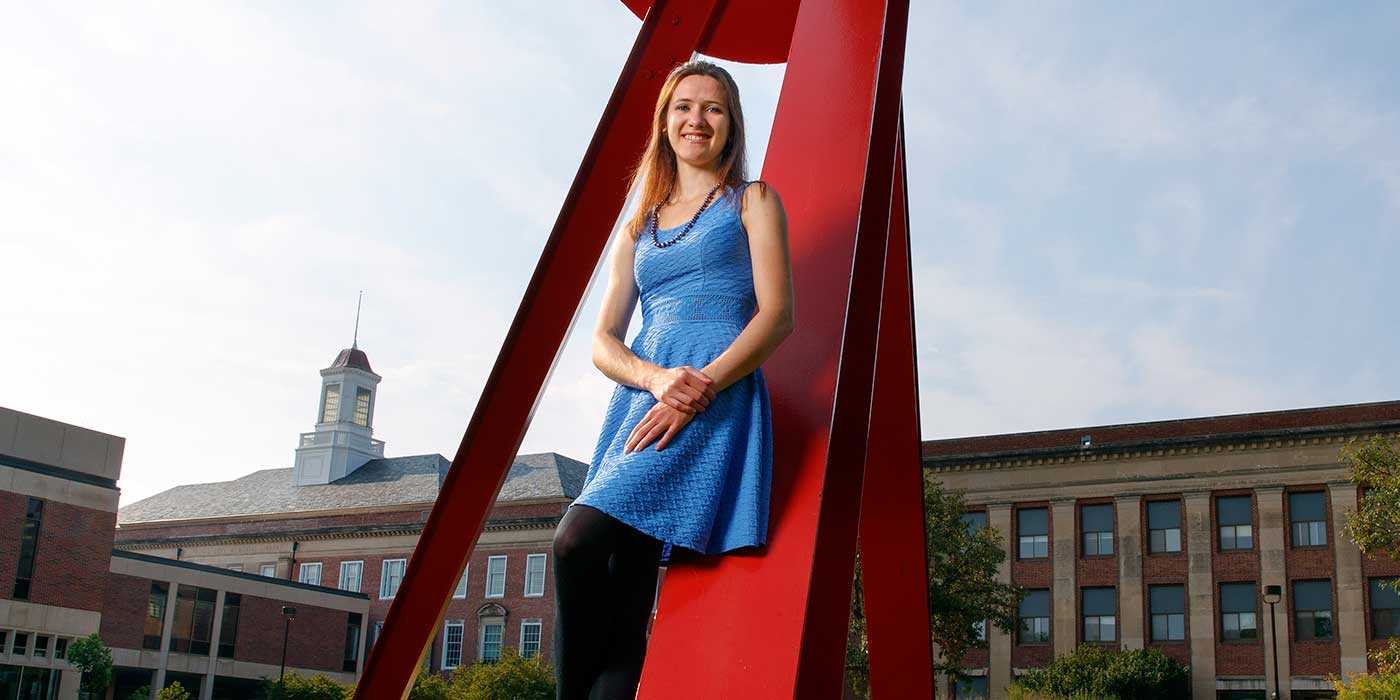LEARNING BY DOING
Space Junk & NFL Math
Nazareth's experiential learning opportunities opened doors for math major Kelsey Quigley '16.
by Sofia Tokar

Some students dread taking a required math course at the college level. Not Kelsey Quigley ’16, who entered Nazareth College undeclared and graduated with a double major in math and German. Once the Syracuse, N.Y., native began studying calculus, “everything started to feel right.”
Part of that feeling was because, she recalls, “I enjoyed the art behind the numbers, thinking logically and solving problems.” The other part Quigley credits to her professors, who encouraged her curiosity at every turn during her studies.
For instance, they supported her decision to study abroad for a semester in Germany, which she took as an opportunity to pursue mathematics. Nazareth-in-Berlin program coordinator and professor Hanns-Dieter Jacobsen helped her secure an internship at the Weierstrass Institute for Applied Analysis and Stochastics, where she attended lectures given by mathematicians from around the world.
NFL predictions, space junk, and other research
Quigley’s professors also offered multiple opportunities to conduct mathematics research as an undergraduate student. She began with an elective course taught by Matthew Koetz, Ph.D., associate professor and chair in mathematics, in which students try to solve an open math problem. Quigley and two classmates chose to explore graph theory. “It was fun to sit down—with pens, paper, whiteboards—and try to apply what we knew or methods we thought would work, and then to see what happened,” she says.
That research project set Quigley up for a major resume-building opportunity: a National Science Foundation-funded Research Experience for Undergraduates (REU) at Rochester Institute of Technology (RIT). The REU gave her a deep dive into conducting full-time math research during the summer. She eventually presented her findings at national conferences, including the 2015 Young Mathematicians Conference and the 2016 Joint Mathematics Meetings.
By then, Quigley was hooked on research—and applying to graduate schools for math. Meanwhile, she gained more practical experience as a tutor for the math department; a German translator of math documents for Heather Ames Lewis, Ph.D., professor in mathematics; and an intern at the University of Rochester’s Department of Biostatistics and Computational Biology.
Up until this point, her research efforts had focused mostly on pure mathematics. But under the aegis of Yousuf George, Ph.D., associate professor in mathematics, Quigley and her classmates explored applied mathematics by developing and evaluating predictive models for the NFL playoffs. “There’s so much data available online—for specific players or player positions, as well as performance stats from the regular season. We had freedom to brainstorm ways to use these different metrics to quantify what a good performing team would be.”
Quigley got even more experience in applied mathematics while working with an industry partner, the Aerospace Corporation, at UCLA during a summer research opportunity called Research in Industrial Projects for Students (RIPS). As part of a small team, she studied the feasibility of sending small satellites called CubeSats into space to track orbital debris (a.k.a. “space junk”). RIPS gave Quigley a valuable sense of research within an industry context.
Pursuing a doctorate
“It’s worth testing the waters,” she advises, “because it’s a great way of getting to know what you would—and maybe even wouldn’t—want to do in the future.” Her own array of experiences reinforced her decision to pursue a Ph.D. in mathematics at University of Nebraska–Lincoln, a large public research university quite different from Nazareth, where she discovered and cultivated her passion.
“I loved all my math professors at Nazareth and it’s weird not having classes with them now,” Quigley says. “They were the ones who pulled me in and showed me that there are all sorts of possibilities if I want to pursue math.”
Sofia Tokar is a writer in Rochester, New York.
Photo credit: Craig Chandler
Learn more
Supporting Great Learning
Gifts to Nazareth's Annual Fund support students like Quigley and high-quality research and classroom learning, sustaining the excellence that is the hallmark of a Nazareth education. Make a gift »